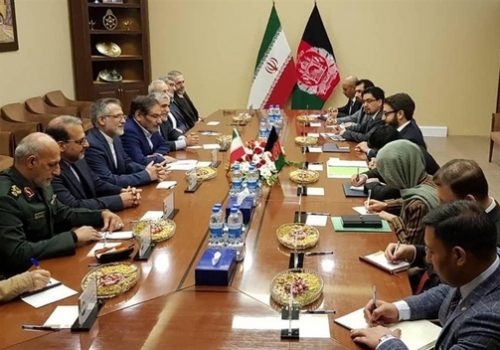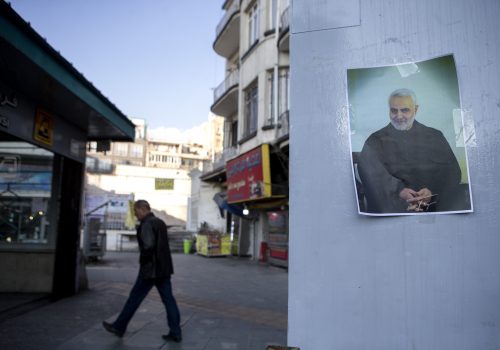How Iran’s new Quds Force commander could hurt the US in Afghanistan
In the midst of US-Taliban peace talks in Doha during early January, the United States launched a drone strike that killed Major General Qasem Soleimani, the head of Iran’s elite Quds Force. In retaliation, on January 8, Tehran fired at least a dozen ballistic missiles at two Iraqi bases housing US troops in Iraq, injuring more than a hundred. To the relief of the international community, the two countries avoided further escalation. Now weeks later, many seem to think this altercation is over.
It is naive to think that these retaliatory attacks will relieve anger within Iran. After all, the United States killed the country’s de facto number two who helped Tehran resume its old status as a major regional power. Soleimani helped Iran shape regional politics and garner influence in Afghanistan, Iraq, Lebanon, Palestine, Syria and Yemen largely at the expense of US allies. As a result, the animosity between the United States and Iran will likely only get worse.
After Soleimani’s death, Iran’s Supreme Leader appointed Brigadier General Esmail Ghaani, Soleimani’s deputy, to lead the Quds Force. Soon after his appointment, experts argued that Ghaani did not have Soleimani’s charisma or distinction as a military commander. Some even suggested that Iran might run its proxy groups and maintain its influence through a committee of generals rather than a single leader. Ghaani will certainly need to prove himself to the Iranian people and most importantly to Supreme Leader Ayatollah Ali Khamenei.
With Ghaani in charge and Iran’s revenge not over, the question remains where and how Tehran might further retaliate. As an Afghan saying goes, “Nothing hurts more than pressing on a wounded fingernail.” America’s injured nail is Afghanistan, and thus the best place for Iran to exact its revenge.
As deputy commander of the Quds Force, Ghaani oversaw operations in Central Asian countries including Afghanistan and Pakistan. During the 1990s, he worked with the Northern Alliance to contain the Taliban. In response, on August 8, 1998, the Taliban stormed the Iranian consulate in Mazar-i-Sharif and killed twelve Iranian diplomats, nearly causing an all-out war between Iran and Afghanistan. Long after the Taliban was toppled following the US invasion in 2001, Ghaani continued his work in Afghanistan and maintained his influence over Afghan politics.
Iran retains close relations with individuals and parties that belonged to the Northern Alliance, among them chief executive of the Afghan unity government, Abdullah Abdullah. He visited the Iranian embassy in Kabul to extend his condolences over the death of Soleimani while the first post-Taliban Afghan president, Hamid Karzai, strongly condemned the US drone strike that killed the major general.
Despite tensions in the 1990s, there has been a thaw between Iran and some elements of the Taliban and numerous reports of Iranian covert support for these factions over the past decade. When the US ended peace talks in September 2019 after President Donald Trump called it off, Tehran openly hosted the Taliban delegation to discuss the future of Afghanistan. This did not result in any concrete outcomes, as it was seen as merely a move to antagonize the US over its decision. Now that a peace deal has been signed between the US and the Taliban, Tehran appears to have been sidelined. However, danger still lies with Iran’s support for breakaway factions of the Taliban.
In 2018, photographs of Ghaani appeared to show him visiting Afghanistan under the cover of a deputy Iranian ambassador with an alias name. He traveled to Bamyan, a Shia majority province in central Afghanistan, and met with the governor to survey construction of an Iranian-funded hospital. Central Afghanistan is also where Tehran draws most of its support. Ghaani’s visit shows the Quds Force’s ability to infiltrate a hostile environment and Tehran’s clear interest in shaping Kabul’s politics post-US withdrawal. It is safe to say that Ghaani’s risky mission was to strengthen his network and influence in the country rather than a mere diplomatic tour.
Now as the commander of the Quds Force, Ghaani can make use of his familiarity with the terrain and political actors of Afghanistan to hit back against the United States. In 2019, Afghan expert Ahmad Shuja Jamal profiled the Fatemiyoun Brigade backed by the Iranian Revolutionary Guards Corps (IRGC). He estimated the number of fighters to be in the tens of thousands, mostly from Shia Afghan refugee communities in Iran and Afghanistan. Having gained combat experience in Syria, fighting in support of Bashar al-Assad, many of these militiamen have now returned to Afghanistan. In the Fatemiyoun Brigade, Ghaani has dealt with foot soldiers ready to carry out attacks against the United States and fulfill the Supreme Leader’s promise of “harsh revenge awaiting the criminals.”
With the current peace deal, the United States is expected to significantly reduce its troop numbers in exchange for the Taliban’s commitment to prevent attacks against the West from Afghan soil. This leaves the possibility of Iran-sponsored proxy groups such as the Fatemiyoun Brigade or Taliban breakaway factions to go after the downsized US troop presence or other American targets in Afghanistan. It is crucial for the United States, the Taliban, and the current Afghan government to address Iranian interference in Afghanistan during the next phases of peace talks as Tehran can spoil the already fragile agreement at any time.
As long as the Trump administration maintains a policy of “maximum pressure” and hostility toward Tehran, Iran has little incentive to make a US withdrawal from Afghanistan easier. Involved parties should be wary of Iran’s activities and seek to end proxy wars, not to pave the way for a new one.
Despite recent developments heralded as breakthroughs in ending the United States longest war, Ghaani as Quds Force commander may not hesitate to press America’s wounded finger. He has the motivation, experience and resources in Afghanistan to avenge Soleimani’s death.
Obaidullah Obaid is an analyst specializing in US and China foreign policy towards South and Central Asia as well as the Middle East. He is also a program analyst with MicroSystems Automation Group. Follow him on Twitter: @ObaidKobaid.
Image: Brigadier General Esmail Ghaani, the newly appointed commander of Iran's Quds Force, reads the will of Major General Qassem Soleimani (Reuters)


